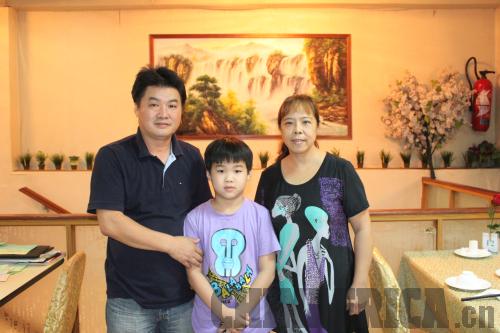|
 |
|
FAMILY PORTRAIT: Hu Xiaomeng and his family in Cameroon (LI ZHIJIAN) |
On Ahmadou Ahidjo Street in Douala, the economic capital of Cameroon, there are several buildings bearing Chinese names like Da Shanghai (Great Shanghai) and Zhong Ka Youyilou (Sino-Cameroon Friendship Building). This is Cameroon's Chinatown. Here, passersby flock to the Great China Hotel and the Great China Market. Located at the edge of the neighborhood, both are owned by one man: Hu Xiaomeng.
Hu's current prosperity is a far cry from when he first arrived in the Central African nation in 1995. Hu had graduated with a degree in English from Sun Yat-sen University, located in the southern Chinese city of Guangzhou. His first job out of school was working at a textile import and export firm in Hubei Province. The job was stable, but nonetheless he decided to head to Cameroon. He brought only $2,000 with him to Douala. At the time, he says, there were only eight other Chinese people living in the city.
Given the minuscule Chinese population, Hu found it difficult to do business in the city. He hoped that would change with the weather. Cameroon in 1996 was marked by a long rainy season, and demand for umbrellas increased greatly. Hu imported a container of umbrellas from China valued at 600,000 yuan ($94,786), and planned to sell them wholesale to local distributors. But he soon found that umbrellas made in China were not large enough to shelter people from Cameroon's torrential downpours. As the end of the rainy season approached, many umbrellas remained unsold.
Hu changed his strategy, turning to retail. He started going to local markets around the country to sell the umbrellas. Although his profits were far less than anticipated, he overcame the risk inherent in such a large inventory.
Hu's luck didn't last long. In 1997, he set his sights on local smokers, and imported 100,000 yuan's worth of lighters from China. (In American dollars, this works out to nearly $16,000.) He gradually discovered, though, that Cameroonian smokers had a habit of buying one cigarette instead of a pack of cigarettes, and sellers always lit these singular cigarettes for their customers. Given these realities, demand for lighters was very limited. In the end, Hu only sold 20,000 yuan ($3,159.60) of his stock.
"The quality and price of Chinese products have a unique advantage in an African market, but to do business, the importer must familiarize himself with the characteristics of the target market and local consumer habits," Hu explains, reflecting on his past. "In a completely strange environment, it's difficult to do that."
The experiences and lessons from his first two years helped Hu to grasp the rules of doing business in Cameroon. His attitude shifted from a position of "We sell what we have," to "We sell what they need." By Christmas 1998, he had garnered his biggest deal yet, selling colored ribbons, small red hats and other festive goods. That year, trade volume between China and Cameroon exceeded $100 million.
As larger numbers of Chinese began arriving in Douala to do business, Hu established the Great China Market, which is home to 50 shops and over 60 warehouses. The market not only provides a center for Chinese businessmen in Cameroon, it also serves as a distribution hub to Chad, Equatorial Guinea, Nigeria and other countries in Central and West Africa.
Hu's wife, Yu Zhongyu, helps him to manage their business. She is also the president of the Chinese Association in Douala, and her business savvy is topped with social insight. She encourages local Chinese in the city to adapt and embrace Cameroonian culture and society. "We and our African friends attach great importance to relationships and are willing to help others in trouble," explains Yu, who is also a practicing Catholic. "The true, the good and the beauty of humanity lie beyond differences in culture." |